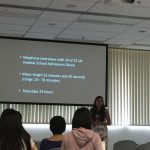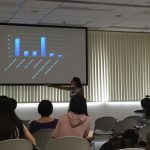Abstract
People from less advantaged social backgrounds, ethnic and culturally diverse groups remain under-represented in medicine worldwide (Association of American Medical Colleges, 2011; BMA, 2009). Although Widening Access (WA) programmes have been implemented to encourage applicants from diverse social backgrounds, recent evidence from the United Kingdom indicates that those from less affluent backgrounds remain less likely to apply and less likely to gain an accepted offer to study medicine than applicants from more “traditional” backgrounds (Steven et al., 2016). This paper investigates how language use from within medical schools contributes to social exclusion in medical education. By examining authentic data from interviews with Medical Admissions Deans from 26 UK medical schools, this paper considers the linguistic barriers to reducing inequality in medical education. Critical Discourse analysis is employed in order to identify the construction of ‘othering’ discourse in statements that refer to students undertaking WA programmes. The results indicate that language use serves to maintain prejudice and block reform of WA practices. This highlights prevalent social development barriers and a need for a review of language use in medical education to promote inclusivity and reduce social inequality.
Speaker
Dr. Tania Fahey Palma
Lecturer in Linguistics, Programme Director of the MSc Professional Communication, Co Director for Internationalisation for the School of Language, Literature, Music and Visual Culture, University of Aberdeen
About the Speaker
Dr Tania Fahey Palma is a Lecturer in Linguistics at the University of Aberdeen where she is Programme Director of the MSc Professional Communication and Co Director for Internationalisation for the School of Language, Literature, Music and Visual Culture. She received the College of Arts and Social Sciences Award for Excellence in Teaching in 2015. She was awarded the AUSA Student Choice Award for Graduate Teaching in 2014. She was also nominated for the College of Arts and Social Sciences Award for Excellence in Teaching in 2014.She has teaching experience at a variety of different third level institutions including the University of Edinburgh, Newcastle University, Beijing Language and Culture University and Mary Immaculate College-University of Limerick.
Date
26 April 2016 (Tuesday), 12:45 - 02:00pm
Location
Room 205, 2nd Floor, Runme Shaw Building , HKU
Chair
Dr. Mairin Hennebry
- ‘Curses in TESOL’: Postcolonial Desires for Colonial English
- “Enhancing Data-Driven Learning in Disciplinary L2 English Contexts: Introducing CorpusMate”
- “Neither Bilingual nor Education”: critiques of bilingual education in state school education and responses to them
- A Two-Tiered Investigation Into the Dual Goal in EMI Education: Assessment and Instructional Practices
- Acculturation and digital trans-literacies in identity construction: An interdisciplinary perspective (Nov 6th, 2025)
- Appropriation of Resources by Bilingual Students for Self-regulated Learning of Science
- Auckland U – HKU Joint Webinar (28 November, 2024)
- Automated Content Feedback and Young English Learners’ Behaviours, Performances and Response
- Book Launch Seminar: Language Across the Curriculum & CLIL in English as an Additional Language (EAL) Contexts
- Critically Engaged Literacy Workshop as Decolonial and Anti-Racist Pedagogy (April 16th, 2025)
- Crosslinguistic influence in foreign and second language learners
- Developing Language Educators’ Understanding of Assessment Reform Discourse and Practices: School-University Collaborative Action Research as Praxis
- Digital literacy pedagogy:
Key issues in the age of Gen-AI
- Digital Multimodal Composing for Specific Purposes: The Case of Sustainability Discourse
- EMI Symposium 2023: Fostering Collaboration
- Exploring Self-Regulated Use of Artificial Intelligence Tools in Language Learning
- Generative AI: Implications and Applications for Education
- Global Englishes-informed Teacher Education: Present Cases and Future Directions
- HKU-NCL Joint Webinar (Nov 27th, 2025)
- HKU-Newcastle U Joint Webinar: Critical Perspectives on Language Policy and Practice (May 2nd, 2025)
- HKU-NIE Joint Webinar: Designing Learning and Assessment with Multimodality in CLIL Classrooms
- Hong Kong SAR Government’s ‘Biliteracy and Trilingualism’ Policy: Sizing Up and Meeting the Challenge
- Hong Kong Students’ Self-regulated English Writing for Academic Studies
- HUMANISING TECHNOLOGY in Language Learning & Teaching
- Interactional Reflexivity in the Age of AI: Rethinking L2 Writing Teachers’ Assessment Literacy Development (Oct 9th, 2025)
- Language ideologies in text-based art of Xu Bing: Implications for language policy and planning
- Language Learning in 3D Virtual Worlds
- Learning about and using academic vocabulary: Critical issues for pedagogy (Feb 18, 2025)
- Motivational and Empowering Feedback in the Writing Classroom
- Multilingualism and its Ramifications
- Multilingualism and Mobility: The Semiotic Production of Centres and Peripheries in Airport Spaces
- Multilingualism and the Brain
- Narrative Skills in Mandarin- English Dual Language Immersion Learners
- Narratives of Cross-Cultural Understanding among South Asian Diasporic Students in Hong Kong
- NCL-HKU Joint Webinar (June 5th, 2025)
- Newcastle U-HKU Joint Webinar on Cultural Artifact Creation (14 November, 2024)
- Oklahoma U-HKU Joint Webinar (05 December, 2024)
- Optimising Classroom Learning: Speaking in and about Mathematics Classrooms
- Policy vs Practice: Homework in Hong Kong EFL Classrooms
- Review of recent research on AI-powered technology in second language teaching, learning and testing (Feb 10, 2025)
- Revival and Threat: Language ideologies, policy, and nationalism in Kazakhstan and Mongolia
- Secondary school students’ source use in inquiry project-based learning (PjBL): Working towards avoiding plagiarism and engaging with sources
- Sociocultural awareness of international ELT policies: The case of a US-funded program in Morocco
- Studies of Public Policy Process and Implications for Research on Education Policy
- The Challenges of Teaching Non-Chinese Speaking Children to Learn Chinese at Kindergarten Level
- The Contributions of Growth Rates in Phonological and Spatial Abilities to Chinese Reading and Mathematical Competencies: A Longitudinal Study of Hong Kong Kindergarteners
- The Digital Literacies Forum 2023
- The Effects of the Medium of Instruction in Physics on Achievement and Motivation to Learn
- The Historical and Linguistic Background of South and Southeast Asian Multi-ethnic Communities in Hong Kong
- The Influence of Extramural Access to Host Culture Social Media on Ethnic Minority Students’ Motivation for Language Learning
- Top desk rejection reasons and how to avoid it
- Translanguaging in Everyday Textual Performances: Implications for Literacy and Pedagogy
- Understanding Language Learning Motivation in Hong Kong
- University of Melbourne – University of Hong Kong Joint Symposium (19 November, 2024)
- Using Reading to Learn Pedagogy to Support Non-Chinese Speaking Students Learning Chinese in Hong Kong
- Videos in language classrooms: A social semiotic perspective
- What can we learn from the Hong Kong Archive of Language Learning Project?
- New technologies in literacy research:
“Measuring” embodiment through
galvanic skin response
- Publishing in top-tier applied
linguistic journals:
Perspectives of an editor�reviewer-author




